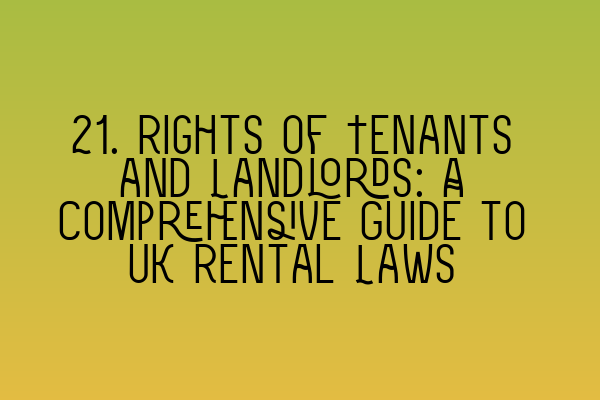21. Rights of Tenants and Landlords: A Comprehensive Guide to UK Rental Laws
When it comes to renting a property in the UK, both tenants and landlords have a set of rights and responsibilities that must be upheld. Understanding these rights is crucial to ensure a smooth and mutually beneficial tenancy. In this comprehensive guide, we will delve into the various rights and obligations that tenants and landlords have under UK rental laws.
Tenants’ Rights
1. Right to a Written Agreement
Every tenant has the right to receive a written tenancy agreement, which outlines the terms and conditions of the tenancy. This agreement serves as a legal protection for both parties and should cover important aspects such as rent amount, duration of tenancy, and any additional clauses or responsibilities.
2. Right to a Safe and Well-Maintained Property
Tenants have the right to live in a property that is safe, habitable, and well-maintained. Landlords are responsible for ensuring that the property meets certain health and safety standards, including proper functioning of utilities, adequate ventilation, and proper maintenance of the structure.
3. Right to Privacy
Tenants have the right to privacy and peaceful enjoyment of their rented property. Landlords must provide reasonable notice before entering the property, except in cases of emergency or with the tenant’s consent. It is important for landlords to respect their tenants’ privacy and not to abuse this right.
4. Right to Have the Deposit Protected
Landlords are required by law to protect tenants’ deposits in a government-approved tenancy deposit scheme. This ensures that the deposit is held securely and can be returned to the tenant at the end of the tenancy, barring any damages or unpaid rent. Failure to protect the deposit can result in fines or legal action against the landlord.
5. Right to Challenge Unfair Rent Increases
Tenants have the right to challenge any excessive or unfair rent increases. Landlords must provide proper notice and should not raise the rent excessively, unreasonably, or without a valid reason. If a tenant believes that the rent increase is unfair, they can seek advice and dispute the increase through a rent assessment committee or tribunal.
Landlords’ Rights
1. Right to Receive Rent on Time
Landlords have the right to receive the agreed-upon rent on time. Tenants are obligated to pay their rent in full and on the agreed-upon date, as stipulated in the tenancy agreement. Late or unpaid rent can lead to eviction proceedings, so it is important for tenants to fulfill their financial obligations.
2. Right to Evict Problematic Tenants
Landlords have the right to evict tenants who breach the terms of their tenancy agreement or engage in anti-social behavior. However, landlords must follow the proper legal procedures and obtain a court order before eviction. It is important for landlords to seek legal advice and understand the eviction process to ensure compliance with the law.
3. Right to Fair Wear and Tear
Landlords should understand that tenants are not responsible for normal wear and tear of the property. They cannot withhold a tenant’s deposit for damages that fall within the scope of fair wear and tear, such as worn carpets or small scuffs on walls. It is important for landlords to distinguish between actual damages and fair wear and tear.
4. Right to Inspect the Property
Landlords have the right to inspect the property periodically, provided that they give reasonable notice to the tenant. Regular inspections allow landlords to ensure that the property is being well-maintained and to address any issues in a timely manner. However, excessive or intrusive inspections should be avoided to respect the tenant’s right to privacy.
5. Right to Recover Possession of the Property
If a tenant breaches the terms of the tenancy agreement or fails to pay rent, landlords have the right to regain possession of the property. However, this must be done through legal means, such as serving a proper notice and obtaining a possession order from the court. Unlawful eviction can lead to serious legal consequences for landlords.
This comprehensive guide provides a glimpse into the rights and obligations of tenants and landlords under UK rental laws. It is important for both parties to familiarize themselves with these rights to ensure a fair and harmonious tenancy. As a tenant or landlord, proper understanding of the law can help protect your interests and ensure a positive rental experience.
For further guidance and assistance on legal matters related to property law and land law, feel free to contact SQE Property Law & Land Law. We offer comprehensive legal services and professional advice to address your specific needs.
Related Articles:
